Jigsaw Sudoku
Box-Jigsaw Sudoku
Aug 5th
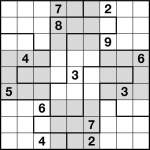
Sudoku Box-Jigsaw 9×9 1 puzzleI haven’t posted a puzzle for a good while, so I thought it was time to fix that with this Box-Jigsaw Sudoku puzzle.
The puzzle combines regular Sudoku with Jigsaw Sudoku. Just place 1 to 9 once each into all of the nine rows, columns, 3×3 boxes (indicated by both shaded and unshaded background areas) and bold-lined jigsaw regions.
Jigsaw Blackout Sudoku
Jun 13th
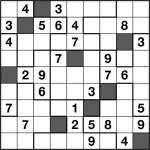
Blackout Jigsaw Sudoku 9×9 puzzleIf you like tricky Sudoku variants, here’s one just for you! It’s a Blackout Sudoku with Jigsaw regions.
The rules are simple: in each row, column and bold-lined jigsaw region you must place 8 different digits in the range 1 to 9. Don’t place a digit on the shaded squares.
If you prefer you can consider it as a standard jigsaw sudoku where the black cell can represent any value, and the value can be different for the row, the column and the jigsaw region. For example the shaded square on the top row could take the place of a 7 in that row, an 8 in its column and a 2 in that jigsaw region.
Good luck! ![]()
Jigsaw Sudoku 6×6
Nov 18th
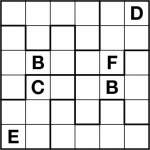
Jigsaw 6×6 puzzle 2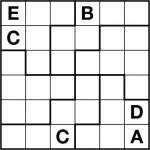
Jigsaw 6×6 puzzle 1I just made some Jigsaw Sudoku puzzles for a book and had a couple spare which I thought I’d post here. Just place A to F once each into every row, column and bold-lined jigsaw shape.
Sudoku [Jigsaw] 6×6
Dec 7th
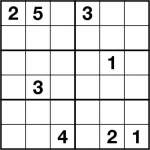
Sudoku 6×6 puzzle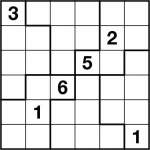
Jigsaw 6×6 puzzle
I had a couple of 6×6 Sudoku puzzles left over when making issue 58 of Sudoku Pro magazine, so I thought I’d post them here.
Just place 1-6 into each row, column and bold-lined area.
Jigsaw Killer Sudoku
Mar 2nd
I’ve recently been working on refreshing the content for PuzzleMix.com, my play-online puzzle site, and one of the puzzle types I’ve been making is Killer Jigsaw Sudoku, where you not only have the jigsaw-shaped Killer regions but also jigsaw shapes instead of the regular 3×3 Sudoku boxes.
So I thought it would be a good idea to post one of these puzzles here – they can be quite tricky, at least until you get your head around the difference between these and regular Killer!
The rules are simple:
- Place 1 to 9 in each row, column and bold-lined region
- Place numbers in the dashed-line cages that add up to the given total for that cage
- No number can be repeated in a dashed-line cage
Good luck! ![]()
Inequality Sudoku
Dec 4th
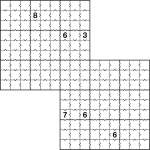
Inequality 2-grid Samurai Sudoku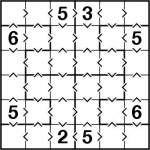
Inequality jigsaw 6×6 Sudoku puzzle
On the Sudoku Xtra forums Marilyn suggested the great idea of an inequality Samurai puzzle for issue 2, so I’ve been having a look at doing this. And here’s the first result!
I’ve started off with a regular 6×6 jigsaw Sudoku, but have added inequalities, just to get you warmed up, then I’ve included my first ever Samurai Inequality Sudoku puzzle, albeit a 2-grid one for now.
You’ll notice in both puzzles here that I have included all inequality arrows, so you have far more information than you need – this is deliberate, to make them easier! On the 6×6 puzzle there are five really nice diamond shapes in the centre area, but in general I think having all the arrows is ugly (or lazy!) so I don’t plan to include them again in future (just as I’ve never included them in past published inequality/Futoshiki puzzles).
The rules of Inequality Sudoku are pretty simple – just place the numbers as you would in a regular Sudoku (or regular Jigsaw Sudoku in the 6×6 case), but obey the less-than (”<”) and greater-than (”>”) signs between squares. These indicate that the value of the number in a square is either less than or greater than its neighbour. And that’s it! ![]()
Good luck!
Jigsaw Sudoku
Oct 30th
I’m adding features back in to my new puzzle assistant front end code so today I thought I’d post the standard Jigsaw Sudoku puzzle that was my test subject – just fit 1-9 into each row, column and bold-lined shape.
Two-away Jigsaw 8×8
Jul 20th
Continuing with Two-away puzzles, I thought today I’d post a somewhat smaller challenge – an 8×8 Jigsaw Sudoku version.
The rules are pretty much what you’d imagine: place 1 to 8 into each row, column and bold-lined jigsaw piece. Numbers with a grey bar between them must have a difference of 2 (e.g. 1&3) and numbers without a grey bar between must have a difference that’s not 2. (This is important to ensure a unique solution!)
Good luck! ![]()
Double Toroidal Killer Sudoku Pro 8×8
May 13th
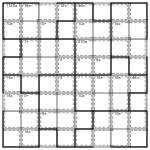
Double Toroidal Killer Sudoku Pro 8×8 puzzle
This puzzle certainly won’t be to everyone’s tastes, but it’s a double toroidal killer sudoku pro. Why double? Because there are toroidal jigsaw-shaped Sudoku regions, and there are toroidal jigsaw-shaped Killer Sudoku Pro cages. In other words, some of them wrap around the edges of the puzzle. It’s also an 8×8 puzzle, just to keep the Killer Sudoku (Pro!) logic fresh.
The rules are as you might expect:
- Place 1 to 8 into each row, column and bold-lined shape – some of these shapes are toroidal, so wrap from the end of one row/column to the opposite end of the same row/column
- Place numbers into the dashed-line Killer Sudoku Pro cages so that when the given operation is applied the result is the stated number. For ‘-’ operations start with the highest number.
- Numbers can’t repeat in dashed-line cages, and some cages (just one in this puzzle actually) are toroidal, so wrap around the rows/columns as described above
And that’s it! ![]() Good luck!
Good luck!
Hints: As always with this sort of puzzle, if you shade in the 8 bold-lined regions first with different colours you’ll find it much easier to keep track of what you’re doing. Also, all of the regions (both killer cages and bold-lined regions) have rotational symmetry order 4 – in other words, the same pattern repeats 4 times; this might help!
Shape Sudoku
Apr 23rd
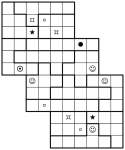
3-grid Shape Jigsaw Sudoku Samurai Stack
I needed to create one of these for a project elsewhere, so I thought I would post a couple of them here too – since I’d gone to the effort to make one at all! It’s not a new Sudoku variation, but just a very simple replacement of the digits 1 to 6 with shapes. None the less, it does make the puzzle notably harder to solve (or maybe that’s just me!). Unless there’s demand I won’t post this variant again, but I thought it would make an interesting change just for once!
I’ve created two examples – one is a simple 6×6 jigsaw, and the other is a 3-grid 6×6 Samurai Stack. In each case place one of each symbol into each 6-square row and column of each underlying 6×6 grid, and also one of each symbol into all of the bold-lined jigsaw shaped pieces.
Good luck!
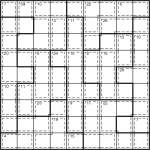
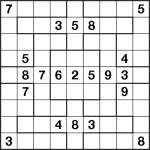
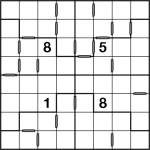
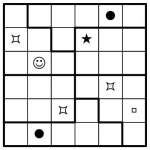

Recent Comments